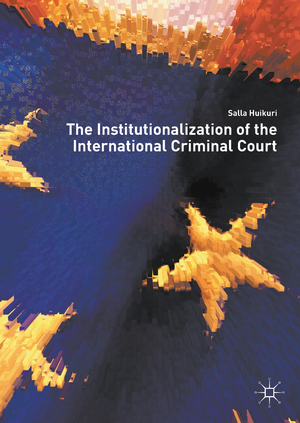The Institutionalization of the International Criminal Court
Autor Salla Huikurien Limba Engleză Hardback – 31 aug 2018
| Toate formatele și edițiile | Preț | Express |
|---|---|---|
| Paperback (1) | 453.60 lei 6-8 săpt. | |
| Springer International Publishing – 31 ian 2019 | 453.60 lei 6-8 săpt. | |
| Hardback (1) | 532.05 lei 6-8 săpt. | |
| Springer International Publishing – 31 aug 2018 | 532.05 lei 6-8 săpt. |
Preț: 532.05 lei
Preț vechi: 625.94 lei
-15% Nou
Puncte Express: 798
Preț estimativ în valută:
101.82€ • 106.17$ • 84.62£
101.82€ • 106.17$ • 84.62£
Carte tipărită la comandă
Livrare economică 21 martie-04 aprilie
Preluare comenzi: 021 569.72.76
Specificații
ISBN-13: 9783319955841
ISBN-10: 3319955845
Pagini: 206
Ilustrații: XXI, 307 p.
Dimensiuni: 148 x 210 mm
Greutate: 0.54 kg
Ediția:1st ed. 2019
Editura: Springer International Publishing
Colecția Palgrave Macmillan
Locul publicării:Cham, Switzerland
ISBN-10: 3319955845
Pagini: 206
Ilustrații: XXI, 307 p.
Dimensiuni: 148 x 210 mm
Greutate: 0.54 kg
Ediția:1st ed. 2019
Editura: Springer International Publishing
Colecția Palgrave Macmillan
Locul publicării:Cham, Switzerland
Cuprins
1. Introduction.- 2. Theorizing the Institutionalization of the International Criminal Court.- 3. Germany and International Criminal Law.- 4. The United States and the International Criminal Court.- 5. The European Union’s Support for the International Criminal Court.- 6. Explaining Late Ratifications to the Rome Statute.- 7. The Philippines’ Late Ratification of the Rome Statute.- 8. Why Indonesia Has Not Joined the ICC?.- 9. Conclusion.
Recenzii
“Salla Huikuri’s book on the emergence and institutionalization of the organization is therefore highly interesting from the point of view of peace research. ... This book is not only a fascinating history of the origin of the ICC, but also an important contribution to the theory of institutionalization of international norms and to cosmopolitan theories on the emergence of global security regimes.” (Timo Kivimäki, Journal of Peace Research, February 27, 2019)
Notă biografică
Salla Huikuri is Researcher at the Department of Political and Economic Studies, University of Helsinki, Finland. She was previously based at the Woodrow Wilson School of Public and International Affairs, Princeton University, USA, and at the Waseda University School of Law in Tokyo, Japan. Her research interests include global governance, legitimacy, EU and US foreign policies, qualitative methods, and international relations theories.
Textul de pe ultima copertă
This book explores the institution of the International Criminal Court (ICC) as a policy instrument. It argues that after the Cold War the European Union started challenging the unilateral policies of the United States by promoting new norms and institutions, such as the ICC. This development flies in the face of traditional explanations for cooperation, which would theorize institutionalization as the result of hegemonic preponderance, rational calculations or common identities. The book explains the dynamics behind the emergence of the ICC with a novel theoretical concept of normative binding. Normative binding is a strategy that provides middle powers with the means to tie down the unilateral policies of powerful actors that prefer not to cooperate. The idea is to promote new multilateral norms and deposit them in institutions, which have the potential to become binding even on unilateralist actors, if the majority of states adhere to them.
Salla Huikuri is Researcher at the Department of Political and Economic Studies, University of Helsinki, Finland. She was previously based at the Woodrow Wilson School of Public and International Affairs, Princeton University, USA, and at the Waseda University School of Law in Tokyo, Japan. Her research interests include global governance, legitimacy, EU and US foreign policies, qualitative methods, and international relations theories.
Caracteristici
Analyses a variety of case studies on the complex process of the institutionalization of the ICC Discusses documentation of the case studies based on a vast number of primary sources Demonstrates the EU’s significant influence on the institutionalization of the ICC
